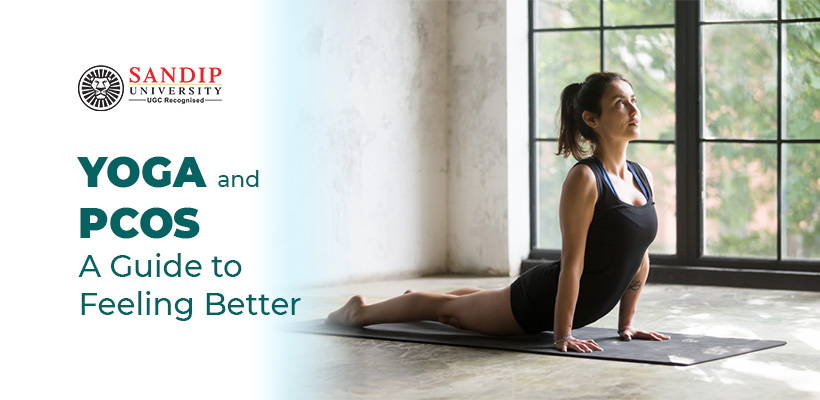Polycystic Ovary Syndrome (PCOS) is a hormonal disorder among females of the reproductive age in which, due to abnormality in hormones, ovaries are releasing immature eggs, or these immature eggs within the ovary are converted into water-filled cysts. It is a hormonal disorder that causes irregular or absent periods, excess facial or body hair, acne, thinning hair, weight gain, fatigue, poor sleep, anxiety, and difficulty conceiving in women leading to infertility. Due to enhanced insulin resistance and related metabolic issues PCOS increases the risk of diabetes and heart disease as well.
Most women in the age group of 24-34 years are reported to be showing some signs and symptoms of PCOS. Dietary changes (eating junk food), lack of sleep, spending more time online, busy schedules and stress are some of the factors contributing towards the rise of PCOS cases in India. Many top private universities in India have dedicated yoga facilities to help students afflicted with PCOS take care of their condition in a healthy environment.
PCOS being a hormonal disorder cannot be cured completely however, with some interventions (medical and non-medical), the symptoms can be managed easily. Lifestyle changes through diet and exercise, medications for regulating menstrual cycles and fertility treatments (for women trying to conceive) are some of the interventions that can help in management of PCOS symptoms.
How Yoga Manages PCOS Symptoms
Yoga is one of the ancient practices and is a significant part of India’s rich culture and heritage. Being practiced by many gurus and yogis since ages, classical yoga is more than just an exercise and includes several rituals to calm your mind, body and soul and help heal the body internally. Some of the traditional yogic practices are: Pranayama (breath regulation); Dhyana (meditation), Kriyas (cleansing techniques like Jala Neti [salt-water nasal rinse]), Asanas (yoga poses/exercises) and Satsang (supportive community).
These simple traditional yogic practices not only have a calm effect on your mind but it also enriches your soul. Several studies have shown that Yoga exercises have proven effects in reducing and managing the symptoms of PCOS along with appropriate medication. It has a mindfulness component that helps promote relaxation and a balanced mood.
Possible Yoga benefits for PCOS management includes:
- Stress Management: Chronic stress can cause symptoms of PCOS to get worse. Yoga helps in calming the mind and body and lowering cortisol (stress-causing hormone) within minutes.
- Balances Nervous System: Yoga has calming effects on the nervous system. When the brain is calmer, the ovaries receive clearer signals from the brain’s hormone centre, which can help regulate periods.
- Improves Insulin Sensitivity: Women with PCOS have a higher risk of developing diabetes and heart diseases. Studies have shown that continuous yoga practice can lower fasting blood sugar and fasting insulin; these further ease sugar cravings and help in weight management.
- Tones the Body: Many yoga poses help in better blood flow in the body organs that support healthy hormone production.
- Boosts Mood and Confidence: Practicing yoga regularly raises serotonin and GABA hormones levels (happy hormones) in the body, which boost mood and confidence.
Apart from this, a lot of research articles and several small pilot studies have also noted better sleep quality, fewer sugar cravings, and lower depression with regular yoga practice. Practicing yoga regularly not only improves your general well-being but is also a great workout to manage stress and certain health conditions such as PCOS.
Pranayama (Breathing Practices) for PCOS:
Breathing practices or exercises may sound simple, but the ancient breathing techniques, such as pranayama, can help calm the mind and body, which helps in better management of PCOS symptoms. Slow, deep breaths activate the parasympathetic nervous system, dropping cortisol (stress hormone) levels in the body and encouraging insulin sensitivity. Pranayama (breathing) practices that can be implemented in daily routine to manage PCOS symptoms are:
- Anulom Vilom (Alternate Nostril Breathing): Calms the nervous system, promotes relaxation, reduces anxiety, and balances hormones.
- Kapalabhati Pranayama (Skull Shining Breath): Detoxifies body, improves digestion, and helps with weight management.
Yoga Poses for PCOS:
It is important to exercise regularly and do some gentle yoga poses for effective PCOS symptom management. The yoga poses help in relaxing the mind and body through slow, deep breaths and will reduce stress levels (cortisol hormone) in the mind and activate the parasympathetic nervous system. Also, stretching the body regularly (around the abdominal and pelvic regions), is extremely helpful and helps with effective weight management in women.
Yoga has some additional benefits such as:
- It does not need any special gear or gym equipment.
- Can be practiced anywhere and anytime
- It helps manage anxiety and stress.
- Boosts overall confidence
- Regulate hormones and help in regularising periods
Conclusion
These are some of the ways in which you can manage your PCOS. Today, many top pharmaceutical science colleges in Maharashtra are conducting path-breaking research to treat PCOS in women. Additionally, for PCOS management, eat healthy (fibre-rich diet including millets, brown rice, vegetables, and fruits), exercise regularly, maintain a regular sleep cycle (ideally 7-8 hours of sleep), listen to your body, and adjust accordingly. It is strongly recommended to consult a professional gynaecologist to manage PCOS. While yoga can help, professional medical treatment is the way to go for long-term relief from the condition.

